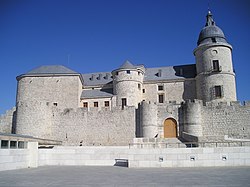Simancas
| Simancas | |
|---|---|
| Municipality | |
 Simancas Castle (late 15th-early 16th centuries) | |
| Coordinates: 41°35′30.9″N 4°49′43.1″W / 41.591917°N 4.828639°WCoordinates: 41°35′30.9″N 4°49′43.1″W / 41.591917°N 4.828639°W | |
| Country | |
| Community | Castile and León |
| Province | Valladolid |
| Comarca | Campiña del Pisuerga |
| Government | |
| • Mayor | Miguel Fernando Rodríguez Ramón |
| Area | |
| • Total | 42.53 km2 (16.42 sq mi) |
| Elevation | 725 m (2,379 ft) |
| Population (2017) | |
| • Total | 5,214 |
| • Density | 120/km2 (320/sq mi) |
| Demonym(s) | Simanquinos |
| Time zone | UTC+1 (CET) |
| • Summer (DST) | UTC+2 (CEST) |
| Website | Official website |
Simancas is a town and municipality of central Spain, located in the province of Valladolid, part of the autonomous community of Castile and León. It is situated approximately 10 km southwest of the provincial capital Valladolid, on the road to Zamora and the right bank of the river Pisuerga.
Simancas originated as the Roman Septimanca.
Main sights[edit]
Sights include a citadel dating from the Al-Andalus period in the 9th century, a bridge of seventeen arches, and many remains of old walls. In 939 it was the scene of a battle between the Christian troops under Ramiro II of León and the Moors of Abd-al-Rahman III.
The citadel is now the Archivo General de Simancas, sometimes called the Archivo General del Reino, to which the national archives of Spain were removed by order of Philip II in 1563. Their transference thither was first suggested to Charles V by Cardinal Ximenes de Cisneros. The extensive alterations were made by three 16th century architects, Juan de Herrera, Alonso Berruguete and Juan Gómez de Mora; the arrangement of the papers was entrusted to Diego de Ayala.
They occupy forty-six rooms, and are arranged in upwards of 80,000 bundles (33,000,000 documents), including important private as well as state papers. The archives of the Indies were transferred in 1784 to the Lonja of Seville. Permission to consult the documents at Simancas can be readily obtained.
See also[edit]
External links[edit]
| Wikisource has the text of the 1911 Encyclopædia Britannica article Simancas. |



